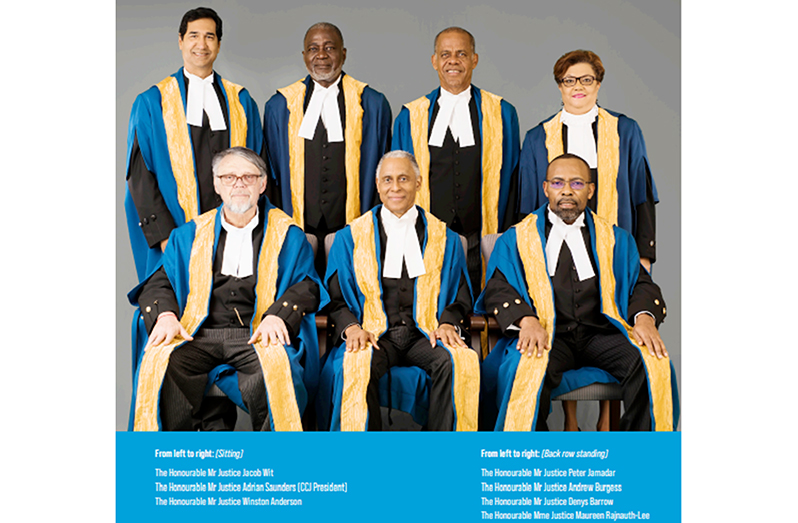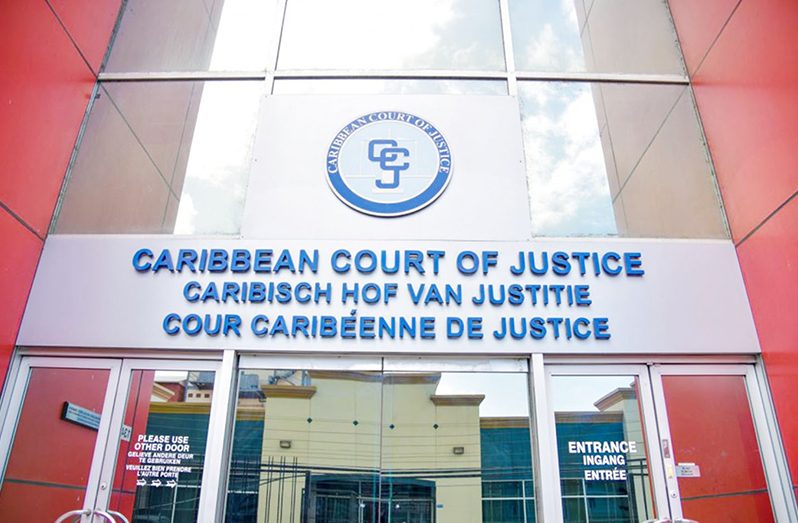By Feona Morrison
THE Caribbean Court of Justice (CCJ) has reported that Guyana filed eight cases in the court’s Appellate Jurisdiction during the 2022-2023 judicial year.
This figure represents a significant 50 per cent decrease from the previous court year, where 16 matters were brought by Guyana before the court’s Appellate Jurisdiction.
A summary of the court year from August 1, 2022, to July 31, 2023, was given by the Trinidad-based court of last resort in its 2022–2023 Annual Report, which was themed “Engage, Empower, Energise.”
The CCJ serves as the final appellate court for Guyana and several other Caribbean Community (CARICOM) nations, namely, Barbados, Belize, Dominica and Saint Lucia.
For the period under review, the CCJ sat 36 times for 13 Case Management Conference (CMC), 15 hearings and eight judgement deliveries. The majority of sittings (86 per cent), were held in complete virtual mode. Hybrid and in-person sittings accounted for six per cent and eight per cent, respectively. The court resumed hybrid and in-person sittings post-COVID-19 pandemic.
From August 1, 2022, to July 31, 2023, 25 cases were filed in the court’s Appellate Jurisdiction. There were eight cases each from Barbados, Belize and Guyana and one from Saint. Lucia.
There were no new cases from Dominica. The report said that this represents an 11 per cent decrease in new matters filed for the reporting period, compared to the previous year.
Sixty per cent were civil matters while 40 per cent were criminal matters.
“The decrease in the volume of new matters being filed is likely to be accounted for by the effects of the pandemic on hearings in the courts below,” the report noted. There were only two new cases filed in the court’s original jurisdiction for the current reporting period. These two cases from Dominica relate to the same factual circumstances. The report stressed that the court’s Original Jurisdiction function remains underutilised compared to its Appellate Jurisdiction.
For the August 1, 2021, to July 31, 2022, judicial year, 28 cases were filed in the court’s Appellate Jurisdiction. Of that total, 16 were from Guyana and six each from Barbados and Belize. No case was filed by Dominica. This total comprised 14 notices of appeal and 14 applications for special leave. Fifty-seven per cent of the matters were civil, while 43 per cent were criminal.
Moreover, in the August 1, 2021, to July 31, 2022, judicial year, one matter was filed in the court’s Original Jurisdiction by Antigua and Barbuda.

One of the landmark cases decided by the CCJ during the current reporting period concerned the interpretation of Guyana’s electoral laws following the controversial 2020 general elections.
The case was Attorney General of Guyana v. Monica Thomas and others.
On October 2, 2010, 16-year-old Neesa Gopaul’s body was found in a suitcase in a creek near the Linden-Soesdyke Highway. Her mother, Bibi Gopaul, and stepfather Jarvis Small were convicted of her murder. In Jarvis Small and Bibi Shareema Gopaul v DPP of Guyana, the CCJ overturned Small’s conviction and reduced Bibi Gopaul’s prison sentence.
The CCJ was inaugurated in Port of Spain, Trinidad and Tobago on April 16, 2005, and presently has a bench of six judges presided over by CCJ President, Justice Adrian Saunders.
Justice Jacob Wit, who was a member of the inaugural CCJ bench in 2005 and diligently served until his retirement in December 2023, passed away on January 16, 2024, at the age of 71.
In its Original Jurisdiction, the CCJ is an international court with exclusive jurisdiction to interpret and apply the rules set out in the Revised Treaty of Chaguaramas (RTC) and to decide disputes arising under it.
The RTC established the Caribbean Community (CARICOM) and the CARICOM Single Market and Economy (CSME). In its Original Jurisdiction, the CCJ is critical to the CSME and all 12 Member States that belong to the CSME (including their citizens, businesses, and governments) can access the Court’s Original Jurisdiction to protect their rights under the RTC.
In its Appellate Jurisdiction, the CCJ is the final court of appeal for criminal and civil matters for those countries in the Caribbean that altered their national constitutions to enable the CCJ to perform that role. Currently, only five states access the Court in its Appellate Jurisdiction.
The CCJ persistently advocates for other CARICOM member states to join its Appellate Jurisdiction instead of using the United Kingdom’s Judicial Committee of the Privy Council. CARICOM’s two largest countries by inhabitants—Trinidad and Tobago and Jamaica—which have a combined population of over four million, still have the Privy Council as their final court. The most populous nation among those that presently fall under the court’s Appellate Jurisdiction is Guyana.
The CCJ has said that by signing and ratifying the Agreement Establishing the Caribbean Court of Justice, member states of CARICOM have demonstrated a commitment to making the CCJ their final court of appeal. “The court is the realisation of a vision of our ancestors, an expression of independence, and a signal of the Region’s coming of age,” the apex court has emphasised.



.jpg)








